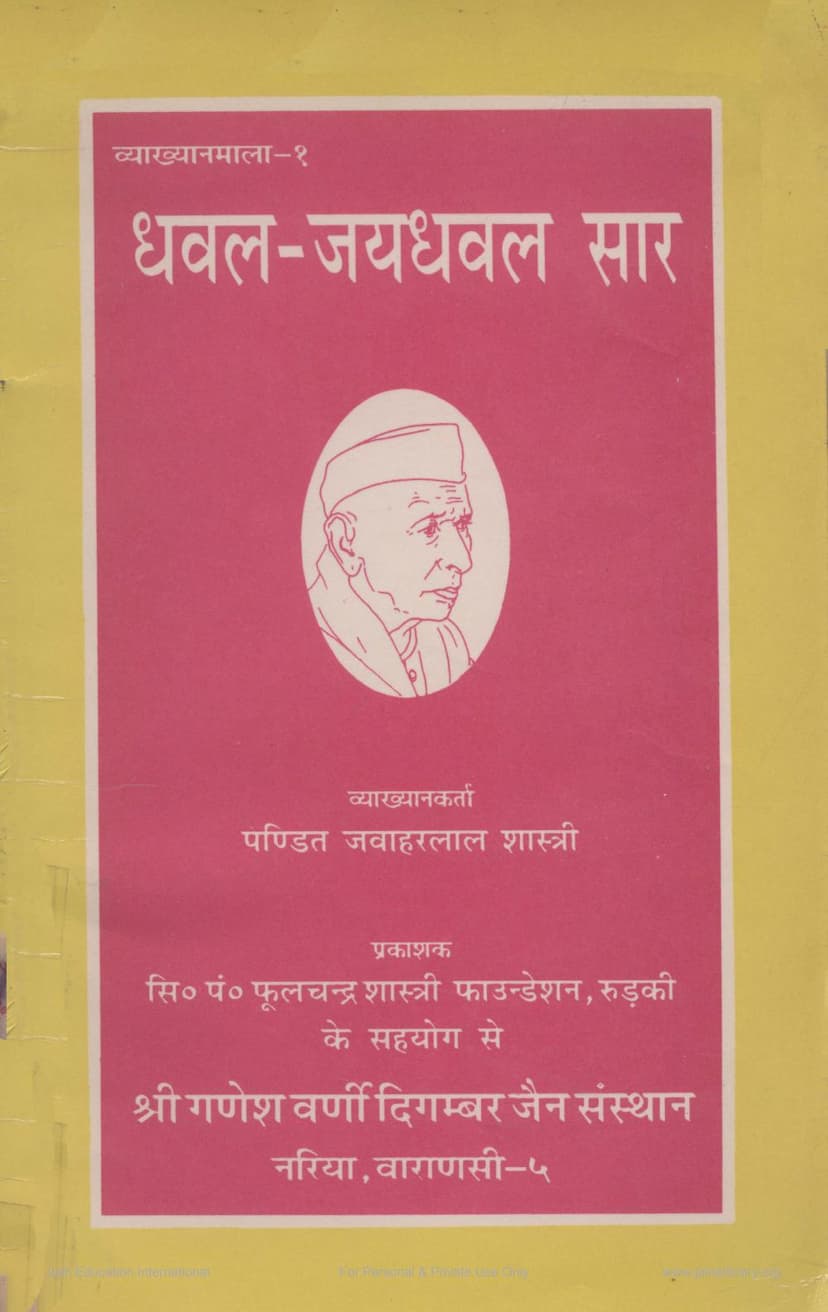Dhaval Jaydhaval Sara
Added to library: September 1, 2025

Summary
This document is the first lecture in a series honoring Siddhantacharya Pandit Phoolchandra Shastri, organized by the Shri Ganesh Varni Digambar Jain Sansthan in Varanasi. The lectures were delivered by Pandit Jawahar Lal Shastri and are published with the support of the Siddhantacharya Pandit Phool Chandra Shastri Foundation.
The book, titled "Dhaval Jaydhaval Sāra" (Essence of Dhaval and Jaydhaval), aims to present the core concepts of these significant Jain philosophical and cosmological texts.
Key aspects covered in the initial lectures and the book's structure:
- Inauguration: The lecture series was inaugurated by the renowned scholar Padmabhushan Pandit Baldev Upadhyay, who highlighted the Jain origins of India's name, linking it to the first Tirthankara, Rishabhadeva.
- The Importance of Dhaval and Jaydhaval: These commentaries are foundational to understanding Jain doctrines, particularly within the Karananuyoga (the division of Jain scriptures dealing with the time and mathematics of the universe).
- Dhaval: A commentary by Acharya Virasen on the Shatkhandagama, written in a mix of Prakrit and Sanskrit, comprising 72,000 verses. It deals with complex philosophical topics like Gunasthanas (stages of spiritual development) and Marganasthanas (paths of spiritual progress).
- Jaydhaval: A commentary by Acharya Virasen and completed by Acharya Jinsena on Kashay Pahud Sutra and its Churni Sutras, totaling 7,000 verses. It primarily focuses on the intricacies of Mohaniya Karma (delusion-causing karma).
- Pandit Phoolchandra Shastri: The lectures and the publication honor Pandit Phoolchandra Shastri, a preeminent scholar who dedicated his life to translating, editing, and explaining these complex texts in Hindi. The document includes a detailed biographical sketch of Pandit Shastri, highlighting his significant contributions to Jain literature and his lifelong commitment to scholarship despite personal challenges. It also lists his numerous published works, translations, and awards.
- Content of the Lectures:
- Lecture 1: Focuses on the subject matter and essence of Dhaval, Jaydhaval, and Mahadhaval. It provides a detailed breakdown of the contents of each volume of the Dhaval commentary, from Volume 1 to Volume 16, and Mahadhaval (7 volumes), and Jaydhaval (16 volumes). It also includes "Amrit Bindu" (drops of nectar) – insightful summaries or key points from various sections of Dhaval.
- Lecture 2: Delves into a detailed analysis of Ayukarma (life-span karma), discussing its definition, types (Narakayu, Tiryanchayu, Manushyayu, Devayu), the process of their binding and origination, the causes for binding them, and the lifespan in different realms. It also addresses the specific rules related to Ayukarma.
- Lecture 3: Focuses on Kshāyika Samyaktva (Kshāyika Right Faith), explaining its nature, the conditions for its attainment, its permanence, and the lifespan of those who possess it. It clarifies that Kshāyika Samyaktva is an eternal state and that it can only be attained by a Vedaka Samyaktvi, not by an Upashama Samyaktvi or one in Mithyatva. It also discusses the stages of spiritual development where Kshāyika Samyaktva can be attained and the rare instances of its attainment in the current era.
- Lecture 4: Presents a series of questions and answers between the speaker, Pandit Jawahar Lal Shastri, and his revered guru, Pandit Phoolchandra Shastri. These discussions cover various complex points from Jain scriptures, including the concept of Anujivi and Pratichivi qualities, the process of Guna Shreni Nirjara, the authority of scriptural texts, the practices of monks, the nature of pure and impure states of soul, the concept of Abhavya and Bhavya, and the restrictions on women and laypeople studying the scriptures. There is also a detailed critique of a particular interpretation by Pandit Motichand Kothari regarding the concept of Akala Marana (untimely death) and Ayukarma binding.
The document is a valuable resource for understanding fundamental Jain doctrines as explained through the lens of two prominent modern scholars, Pandit Phoolchandra Shastri and Pandit Jawahar Lal Shastri, and their interpretations of classical Jain texts like Dhaval and Jaydhaval.